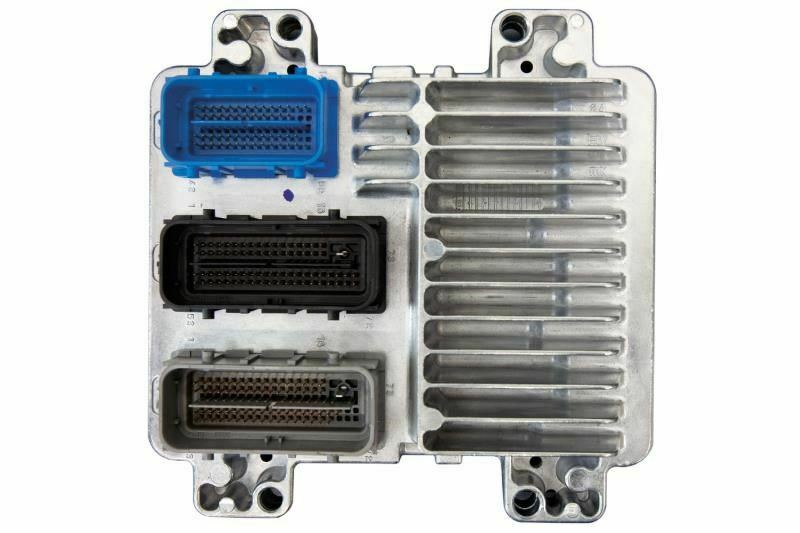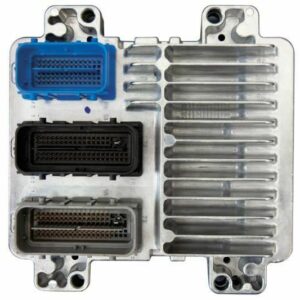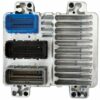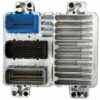Restore Peak Performance to Your High-Powered GM Vehicle
Is your 2009 Corvette, CTS-V, or Trailblazer SS suddenly running rough, stalling, or refusing to start? As a technician with over two decades of experience under the hood, I’ve seen these symptoms countless times. More often than not, the culprit is a failing Engine Control Module (ECM)—the computer that acts as the vehicle’s brain. When it falters, it can cause a cascade of frustrating and hard-to-diagnose issues. This isn’t just an inconvenience; it robs your vehicle of its power, reliability, and the driving experience you expect.
This isn’t just a replacement part; it’s a complete, hassle-free solution. We offer a genuine GM Engine Control Module, service part number 12622175, that arrives at your door fully programmed to your specific vehicle. Simply provide us with your Vehicle Identification Number (VIN) during checkout, and our experts will flash the module with the latest, most stable software updates directly from General Motors. This critical step ensures seamless communication with your vehicle’s other systems, eliminating the need for an expensive trip to the dealership for programming.
Case Study: A Tricky Diagnosis
I remember a 2009 Corvette ZR1 that came into the shop with a maddeningly intermittent no-start condition. The owner had already replaced the battery and starter. Scans showed a flurry of communication loss codes (U-codes) but nothing consistent. After checking the main power and ground circuits to the ECM, we noticed that a simple tap on the module’s case could sometimes make the problem appear or disappear. It was a classic case of an internal solder joint failure within the ECM. We installed one of our pre-programmed modules, and the 638-horsepower beast fired up instantly and never had the issue again. This is why a quality, correctly programmed module is non-negotiable.
The Advantage of a Pre-Programmed 2009 Corvette Engine Control Module
The biggest hurdle in replacing a modern ECM is the software. Our service takes that obstacle completely out of the equation. By programming the module before it ships, we ensure that when you install it, it’s ready to integrate with your engine, transmission, and security systems (though a security relearn may be required). This is the most efficient way to get your vehicle back to factory-spec operation without specialized scan tools or dealership intervention.
Common Signs of a Failing ECM
- ✔ Check Engine Light is on with codes like P0601, P0602, P0606, or U0100.
- ✔ The engine cranks but refuses to start.
- ✔ Unexplained stalling or rough idling.
- ✔ Noticeable decrease in fuel economy.
- ✔ Poor engine performance or hesitation during acceleration.
- ✔ Automatic transmission shifting erratically or harshly.
- ✔ Communication errors with diagnostic scan tools.
A Straightforward Guide to Installation
- ✔ Safety First: Disconnect the negative terminal from your vehicle’s battery and secure it away from the post to prevent accidental contact.
- ✔ Locate the ECM: On a 2009 Corvette, the ECM is typically located in the right-hand front portion of the engine compartment. For other models, refer to the fitment list for its general location (e.g., RH firewall, LH engine).
- ✔ Disconnect Connectors: Carefully release the locking tabs on the electrical wiring harnesses and gently pull them straight out from the module. Do not force them.
- ✔ Remove the Old Module: Unbolt the old ECM from its mounting bracket. Note the orientation of the module before removing it.
- ✔ Install the New Module: Mount your new, pre-programmed ECM onto the bracket and secure the bolts.
- ✔ Reconnect Everything: Firmly plug the wiring harnesses back into the new module until they click into place. Reconnect the negative battery terminal.
- ✔ Perform Security Relearn: In many cases, a simple security relearn procedure is required. This typically involves turning the key to the ‘ON’ position for 10-15 minutes. Consult your vehicle’s service manual for the exact procedure.
Verified Vehicle Compatibility
This module is a direct replacement for part number 12622175 and is interchangeable with service numbers 12636659, 12639300, 1263605, 12628993, 12628911, 12625453, 12630464, and 12678512. It is confirmed to fit the following vehicles:
- Cadillac CTS (2009): 6.2L
- Cadillac DTS (2009-2011)
- Cadillac SRX (2009): 4.6L
- Cadillac STS (2009-2010): 4.4L, 4.6L
- Cadillac XLR (2009)
- Chevrolet Colorado (2009-2012): 2.9L, 3.7L
- Chevrolet Corvette (2009): ZR1
- Chevrolet Trailblazer (2009): 6.0L
- GMC Canyon (2009-2012): 2.9L, 3.7L
- GMC Envoy (2009): 5.3L
- Hummer H3 (2009-2010): 3.7L
- Buick Lucerne (2009-2011): 4.6L
- Saab 9-7X (2009)
Frequently Asked Questions
Do I really need to provide my VIN?
Yes, this is absolutely essential. We use your VIN to load the correct GM-certified software and calibrations for your vehicle’s specific engine, transmission, and options. This ensures a true plug-and-play installation.
Will this fix my check engine light?
If your check engine light is caused by an internal failure of the ECM (common codes include P0601-P0606), then yes, this module is the correct fix. However, you should always diagnose the codes first to ensure the fault isn’t with a sensor or wiring.
Is any other programming required after installation?
No additional programming is needed. However, you will likely need to perform a simple ‘Security Relearn’ or ‘Anti-Theft Relearn’ procedure, which can be done without special tools and typically takes about 10-15 minutes. Instructions are widely available online for your specific model.
Is this part difficult to install for a DIYer?
For most vehicles on the fitment list, this is a straightforward DIY job. The ECM is usually easy to access, requiring only basic hand tools to unbolt it and disconnect the wiring harnesses. Our pre-programming service handles the most difficult part for you.
What is the difference between an ECM and a PCM?
ECM stands for Engine Control Module, while PCM stands for Powertrain Control Module. In many modern vehicles, the terms are used interchangeably. A PCM controls both the engine and the transmission, while an ECM may only control the engine. For the vehicles listed, this module manages all necessary powertrain functions.



